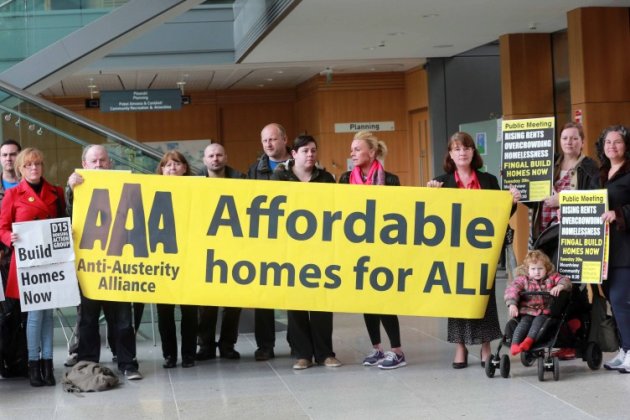Charities dealing with families on the brink of homelessness have welcomed the government’s homelessness plan, but many believe it is missing crucial elements.
Threshold, the national housing charity, has welcomed the plan to address homelessness published, but said the plan missed a crucial opportunity to reform Rent Supplement and introduce a system of rent control.
At a press briefing, Housing Minister Jan O’Sullivan had said that there will be “flexibility” in rental to rent supplements.
Bob Jordan, Chief Executive of Threshold, said that they are disappointed that the plan doesn’t overhaul the system entirely.
“We are disappointed that this plan does not provide for an overhaul of the Rent Supplement scheme or the introduction of any form of rent control.
“The plan does outline that there will be ring-fenced housing for homeless people and that additional resources will be made available to address homelessness, both of which are welcome measures.
“More worryingly, the indications from government are that there will be no increases to Rent Supplement levels in the coming months, and there is nothing substantial in this plan about Rent Supplement reform.”
Kerry Anthony CEO of Depaul Ireland, which works with people at risk of homelessness adds “the families we are working with are facing immense hardship. They have come from homes they could not to afford to keep due to escalating rental prices and have been forced into sub-standard emergency accommodation.”
“Focus Ireland welcomes the plan but warns that it will not succeed if there is an over-emphasis on the quick fix of turning unused buildings into more emergency accommodation without ensuring urgent action to increase access to affordable housing for people who are homeless and those at risk.”
Sean Moynihan, CEO of ALONE, the charity that supports older people in need, called the move ‘a step in the right direction’, but criticised the delay in the publication of the plan.
“It’s a scandal that it had to reach this point before the government took notice. Today’s newly announced housing plan is a step in the right direction but it remains to be seen whether the government will follow through on their promises.”
----------

----------
A generation of Irish children could grow up in emergency accommodation because of a new wave of families becoming homeless due to the housing crisis.
Children’s charity Barnardos yesterday claimed the current housing crisis could become a “full-blown epidemic” amid stories of families living in hotels, emergency accommodation and children having to switch schools because their families have to move areas due to rising rents.
The problem is most acute in Dublin but Barnardos said clients at its centres in Cork, Limerick, and Thurles were similarly affected, with the charity’s CEO Fergus Finlay claiming the lack of state support was contributing to the problem.
The Government will today discuss plans to deliver 2,700 housing units in the next three years through a number of measures, including bringing state properties into housing use and putting boarded-up, local authority houses back into use.
Taoiseach Enda Kenny said it was “not acceptable” that six people are becoming homeless every day. “Government has got to respond in an urgent fashion, and we will. However, it is not possible to provide instant homes overnight.”
Some of the issues raised by Barnardos yesterday were stark, from staff describing a mother living on a relative’s floor, waiting for everyone to go to sleep before she can put her three-year-old to bed, to the statistic of 25% of the families using one Barnardos service in south Co Dublin living in emergency accommodation.
The charity said children were “the hidden victims” of the growing housing crisis, with emergency accommodation sometimes so far away from where they used to live some children must travel two hours each way to school and other services.
Francis Chance, assistant director of children’s services in Barnardos, said many families already living in emergency accommodation might already be contending with issues such as long-term unemployment or mental health concerns.
But he said there was “another layer, families on the point of being made homeless,” who had none of those issues and who were on the brink due to factors such as a shortage of housing stock, possible home repossession or eviction, and diminished income. Some people in parts of west Dublin had been told their housing needs would be met “in five or 10 years time,” he said. This meant many children would be growing up in households marked by tension, with some children likely to end up in trouble or even being taken into care as a result.


No comments:
Post a Comment